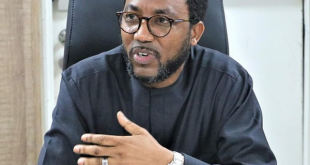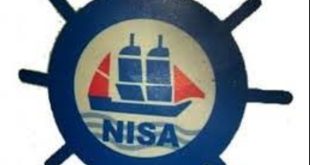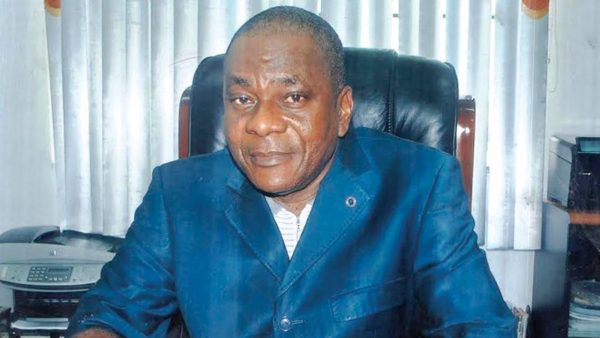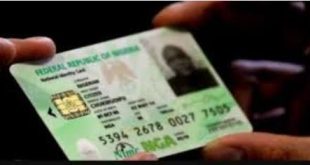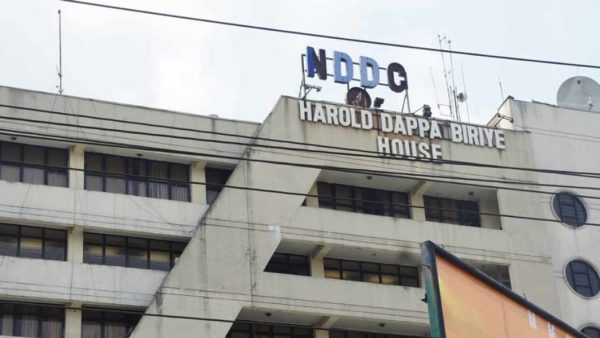 · Oil producing states squandered N8trn in 20 years
· Oil producing states squandered N8trn in 20 years
· Unpaid levies got CRFFN delisted from FIATA
· COVID-19, Associations’ fracas stalls re-accreditation
By Kenneth Jukpor
Over N769billion has been squandered by the Niger-Delta Development Commission (NDDC) from 2004 to 2019, while the N2.5billion allocated for forensic audit of the Commission’s account has been labeled as more appalling.

The breakdown of the budgetary allocation to NDDC since inception; 2004: 14.00billion, 2005: 28.80 billion, 2006: 26.13 billion, 2007: 24.00 billion, 2008: 40.57 billion, 2009: 27.13 billion,2010: 46.49 billion, 2011: 55.08 billion, 2012: 48.67 billion, 2013: 61.35 billion, 2014: 61.94 billion, 2015: 46.72 billion, 2016: 41.05 billion, 2017: 64.02 billion, 2018: 81.88 billion, 2019: 100.19 billion and 2020: 80.88 billion.
In spite of claims of neglect and abandonment, investigation has revealed that governments of oil-producing states in Nigeria had over the years, failed to utilize the resources provided to develop their states and the region.
Data obtained from the Office of the Accountant General of the Federation, revealed that oil-producing states in Nigeria received N8.66trillion as payments under the 13 percent Derivation principle over the last 20 years, from 1999 to 2019.
The huge sum, notwithstanding, the Niger-Delta region still suffers massive infrastructure decay, widespread poverty and environmental degradation, among other numerous challenges.
These mind-blogging revelations emerged as a result of the ongoing panel investigation by the Senate as the Minister for Niger Delta Affairs, Dr. Godswill Akpabio stated that the estimated cost of the forensic audit exercise was set at N2.5billion to be funded from the budget of the NDDC and approved by President Mohammdu Buhari.
After the various allegations against the interim managers of the NDDC, and the Ministry of Niger Delta Affairs and the counter-allegations against members of the National Assembly by the Minister, Nigerians who have been fed with absurd tales may have to wait longer to know the truth.
Recall that the Prof. Daniel Pondei-led Interim Management Committee, IMC, of NDDC appeared before Senator Peter Nwaoboshi-led Senate Committee on Niger Delta Affairs on different occasions, even as he fainted while being drilled with questions at the last outing.
Addressing the Senate in the penultimate week, the Minister stressed that NDDC budget comes from the annual national appropriation, as a single line vote which the 2020 Appropriation Act signed into law by the President on Tuesday, December 17, 2019 and went into force on January 1, 2020 providing the sum of N80.88billion for NDDC.
According to him, in the 2019 Budget, a statutory transfer for the NDDC in the Federal Government of Nigeria Budget was put at N71,195,023,528.62.
His words: “Earlier in October, 2019, the President had approved the funding of the Forensic Audit exercise by an estimated sum of N2.5billion to be sourced from the budget of the NDDC. The process leading to the final award of contract for the Lead Consultant was completed in March 2020 when the two Houses of the National Assembly had passed the 2019 Budget of the NDDC.”
“On the passage of the 2019 statutory Appropriation as indicated above, the sum of N1,250,000.000.00 was provided for the forensic audit of the Commission on March 4 and 5, 2020 by the Senate and the House of Representatives respectively. However, the Clerk to the National Assembly conveyed a letter forwarding the passage of a budget of the NDDC for the 2020 fiscal year.”
“To kick-start the process for the Forensic Auditing exercise, the then Ag. Managing Director of the NDDC, vide a letter dated December 6, 2019 transmitted to the Bureau of Public Procurement prequalification, technical and financial documents of Messrs. Jake Riley Ltd as a Lead Consultant to recruit other Forensic Auditors for the Commission. The BPP reviewed the submission and vide its report Ref. No. BPP/DPR/SP/REPORT/2019/093 of January, 2020 conveyed approval for the adoption of Direct Procurement method for the engagement of a Lead Forensic Consultant but declined to certify Messrs. Jake Riley Ltd because its submission was not responsive.Thereafter, the NDDC vide letter Ref. No. NDDC/HQ/MD/BPP/2019/09 dated December 30, 2019 (copy attached as Annex IV) again transmitted to the BPP the prequalification, technical and financial documents of Messrs. Olumuyiwa Basiru & Co. for review and Certification of award of contract as Lead Forensic Audit Consultant at the cost of N335,601,562.50.”
He stressed that the BPP reviewed the firm`s capacity, credentials and issued a Due Process Certificate of No Objection to Award, Ref. No. BPP/S.1/Vol.XV/19/108 dated January 08, 2020 in favour of Messrs. Olumiuyiwa Basiru & Co. and its engagement as the Lead Consultant for the recruitment and supervision of Forensic Auditors and the coordination of the conduct of the forensic audit of the NDDC, at the total Consultancy Services Fee of N318,903,750.90 only.
“In line with its mandate to recruit field forensic auditors for the exercise, the Lead Forensic Auditor, through the Ministry of Niger Delta Affairs in the letter Ref. No. MNDA/PROC/NDDC/20/263/Vol.1/9 dated March 20, 2020 sought and received a ‘No Objection’ Approval from the Bureau of Public Procurement (BPP) for the appointment of the field forensic auditors through Selective Tendering process. Subsequently, the Evaluation Report with the Technical and Financial Tenders were transmitted to the BPP for review and certification. The Bureau reviewed the procurement processes and certified the process and issued a Certificate of ‘No Objection’ to award Ref. No. BPP/S.1/Vol.XVI/20/084 dated June 29, 2020 (copy attached as Annex IX) for appointment of the nine (9) firms and companies reflected in the Report as field forensic auditors for the conduct of the Forensic Audit of the NDDC, at the cost of N817,033,002.48 inclusive of all taxes and VAT at 7.5% with a completion period of 6 months and directed that the remaining seven (7) project lots be re-procured,” he said.
In another development, the Council for the Regulation of Freight Forwarding in Nigeria (CRFFN) has been delisted from the international regulatory body for freight forwarding practice, International Federation of Freight Forwarders Associations (FIATA).
Although the agency has been accrediting tertiary institutions in the country to train individuals on FIATA approved courses, CRFFN has been delisted by FIATA after owing levies for years.
The Deputy Registrar, CRFFN, Dr.Alban Igwe confirmed this while discussing with our correspondent last week.
He, however, stated that the agency recently paid its outstanding debts, noting that the COVID-19 pandemic stalled the FIATA meeting which should have seen CRFFN re-accredited since March this year.
His words: “We were deregistered because we didn’t pay our dues for some time. However, we have paid now and we are waiting for a FIATA meeting which should have held in Zurich, Switzerland in March, 2020. The meeting was cancelled as a result of the COVID-19 pandemic.”
“Another congress was intended to hold in October but that one has also been postponed indefinitely. I spoke with the FIATA representative few days ago to find out our situation since we have paid our debt. He assured that FIATA would have an online meeting where they would reinstate CRFFN.”
Meanwhile, the condition for CRFFN’s deregistration has become a subject of debate as the Founder of National Association of Government Approved Freight Forwarders (NAGAFF) Dr. Boniface Aniebonam posited that the removal of CRFFN was as a result of the agency’s stance as a government establishment.
According to him, FIATA doesn’t recognize organizations affiliated to the governments, but professional groups with the objective of professionalism.
“One of the problems of CRFFN’s relationship with FIATA is the positioning of CRFFN as a government agency. This is a deviation from the original goal of CRFFN and NAGAFF is in court over this matter. We will take it up to the Supreme Court because we believe that CRFFN shouldn’t be an agency of the government,” Aniebonam told MMS Plus.
Alban Igwe, however, opined that CRFFN’s stance as a government agency wasn’t a threat to its affiliation with FIATA, arguing that the Council wasn’t the only government agency at the international freight forwarding body.
“There areseveral countries that have more than one representative at FIATA and Nigeria being represented by a government agency is because the freight forwarders didn’t have unity to place themselves under one platform for this purpose,” he said.
Speaking on the lack of unity among freight forwarders in the country, the President of Africa Association of Professional Freight Forwarders and Logistics of Nigeria (APFFLON), Mr. Frank Ogunojemite admonished the various freight associations to shelve their differences for the interest of the sector.
Ogunojemite admonished the leaders of freight forwarding groups to take a cue from the new collaboration between parastatals under the Ministry of Transportation, especially in the maritime sector.
While commending the maritime agencies for the crucial meeting of heads of the parastatals which held at the headquarters of the Nigerian Shippers Council (NSC), with the CEOs agreeing on modalities for handling areas of overlap in their responsibilities, Ogunojemite posited that the challenges stalling the progress of CRFFN would be eliminated with synergy among freight forwarding associations.
“It is unfortunate that CRFFN has been parading FIATA logo on its website as its partner while it had been delisted. However, the freight associations who should be concerned and step up to address this are busy fighting one another. It is high time we learn from the synergy among maritime agencies and address the common challenges we have as practitioners,” he said.
 MMS PLUS NG – Maritime, Aviation, Business, Oil and Gas News Online Newspaper with coverage in Maritime, Oil and Gas, Aviation, Power and Energy as well as Financial News
MMS PLUS NG – Maritime, Aviation, Business, Oil and Gas News Online Newspaper with coverage in Maritime, Oil and Gas, Aviation, Power and Energy as well as Financial News




